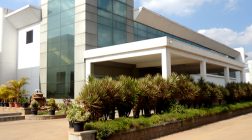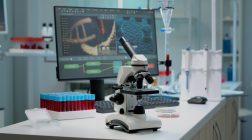Dr Kannan Vishwanatth, Royal Society of Chemistry fellow develop Breakthrough Innovations in Cancer Treatment.

Rupus Global Founder Dr Kannan Vishwanatth has made Breakthrough in nanotechnology that could dramatically improve medical tests at the Rupus Global R & D centre at Riga, Latvia.
Prof. Dr Kannan Vishwanatth, Chemical Engineer & Researcher at the Hong Kong based Rupus Global Limited having worldwide offices at United Arab Emirates, Singapore & Latvia has come out with cutting edge innovations & breakthrough innovations in Cancer diagnosis, treatment & medications. The team of researchers led by Prof. Dr. Kannan Vishwanatth has developed Integrated development of innovative nanoparticle packages and active pharmaceutical ingredients enabling exploration of a wider repertoire of active ingredients, no longer confined to those with acceptable pharmokinetic or biocompatibility behavior.
Speaking on the research outcome, Prof. Dr Kannan Vishwanatth told “Our facilities are equipped with state-of-the-art machinery, ready to pump out the breast, ovarian and non-small-cell lung cancer Intermediates used for chemotherapy. Other uses of our Intermediates include diarrhea and obstructive jaundice. We make injected, oral, and novel drug administration method meds. To ensure safety, all of our intermediates are ISO 9001:2015, ISO 14001:2015 ISO 22000:2015, and OSHA 18001:2015 certified”. Elaborating the scope of research & innovatioons Dr Kannan Vishwanatth told “We are developing nanotubes, nanoprobes, nanomaterials, nanocatalysts and nanostructures for a variety of applications in energy conversion, medicine and electronics, for example. Our faculty and students apply both state-of-the-art experimental techniques and sophisticated computational approaches. research focus is the development of advanced MEMS tools for understanding cell trafficking in cancer through isolation, characterization and study of circulating cell in peripheral blood of cancer patients. These investigations will progress to the design and development of smart chips that use microfluidics and nanotechnology to make an impact in medicine and life sciences. is developing nanoparticles for reprogramming immune cells for use in precision immunotherapies, with applications to autoimmune disease, allergies, transplant rejection and inflammation. aim to develop next generation technologies for designing, discovering, engineering, characterizing, formulating and delivering monoclonal antibodies and other biologics for molecular imaging, diagnostic and therapeutic applications. Their research uses nanotechnology-based methods for i) discovering new antibodies and other therapeutic proteins, ii) identifying rare protein variants with drug-like properties for therapeutic applications, and iii) selecting formulation conditions that promote high protein stability and resistance to aggregation. The increased performance could greatly improve the early detection of cancer, Alzheimer’s disease and other disorders by allowing doctors to detect far lower concentrations of telltale markers than was previously practical. In addition to diagnostic uses, immunoassays are commonly used in drug discovery and other biological research. More generally, fluorescence plays a significant role in other areas of chemistry and engineering, from light-emitting displays to solar energy harvesting, and the D2PA material could find uses in those fields.
Projected to reach $33.63 billion by 2030, from its current $1.76 billion market size value, nanotech is well on its way to trending as one of the current fastest-growing sciences, not just due to its percentage increase, but in its continued collaboration with industries across the board, and sharing budget of their market share. Future applications are genuinely limitless through nanotechnology, and living during this age of exploration is exciting.
The breakthrough involves a common biological test called an immunoassay, which mimics the action of the immune system to detect the presence of biomarkers — the chemicals associated with diseases. When biomarkers are present in samples, such as those taken from humans, the immunoassay test produces a fluorescent glow that can be measured in a laboratory. The greater the glow, the more of the biomarker is present. However, if the amount of biomarker is too small, the fluorescent light is too faint to be detected. A major goal in immunoassay research is to improve this detection limit.
Rupus Global Chemical Researchers at the Rupus R & D Centre at Riga in Latvia are also exploring collaborations to further their work through in vivo studies in animal models. This could include mice and canines. Research would then advance to clinical trials involving wearable devices on humans.The three core cancer treatments are chemotherapy, radiation and surgery. This trio has been instrumental in saving millions of lives from early cancer-related death, but they all have distinctive limitations, especially when it comes to their precision in targeting individual cells. In other words, they often damage healthy tissues while failing to completely eradicate cancerous ones. Enter nanoparticles for chemotherapy delivery. Researchers from multiple universities have explored the use of these particles for delivering medications. A group at MIT combined the drug Doxil with an RNA interference therapy and coated the combo with hyaluronic acid to ensure survival within the bloodstream. The use of nanotech may also be beneficial for earlier detection and diagnosis of cancer. For example, a Nano device might help capture proteins associated with cancer, along with circulating tumor DNA and exosomes from tumors. More efficient detection can increase the chances of multi-year survival, pending proper treatment.
Visionary entrepreneur Dr Kannan Vishwanatth based out of Riga, Lativia is the Founder & Managing Director of our Hong Kong-based pharmaceutical company Rupus Global Limited. He holds a doctorate in Business Management (PhD). Dr Kannan Vishwanatth is a top academic researcher at the Garwood Innovation Fellow at Garwood Centre of Open Innovation, Haas School of Business Berkeley University of California & Senior Research Scholar at the Latvian Academy of Sciences in Riga. Dr Vishwanatth further pursued higher studies from the University of Azteca European Programs& fellow researcher at the Royal Society of Chemistry. Prof. Dr Kannan Vishwanatth is also the founder & chairperson at Rupus Global Herbal Research & Development Institute










